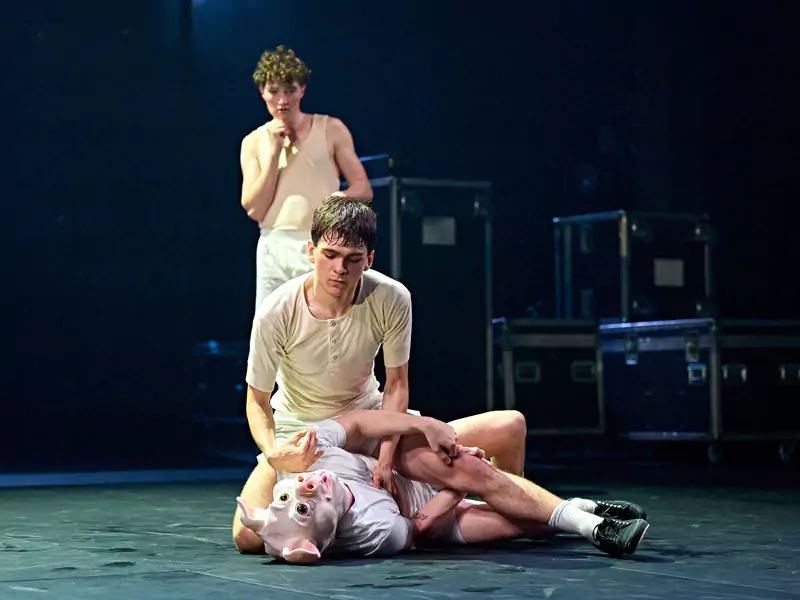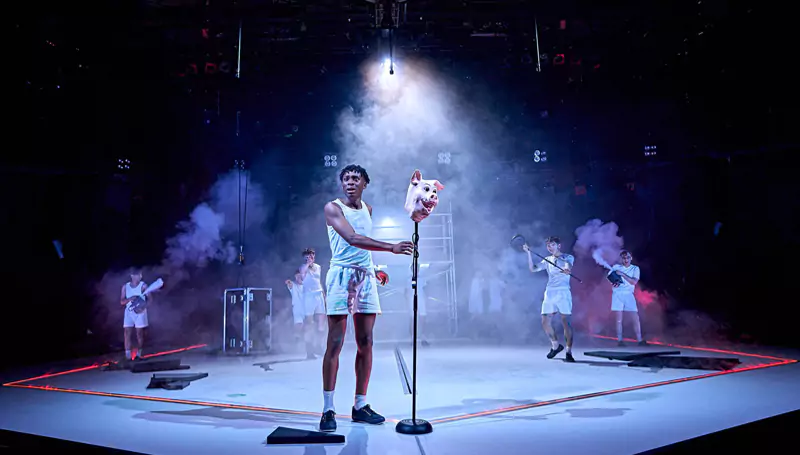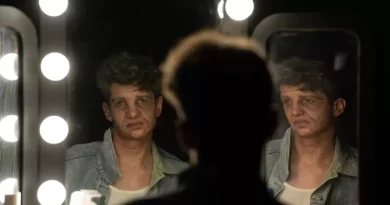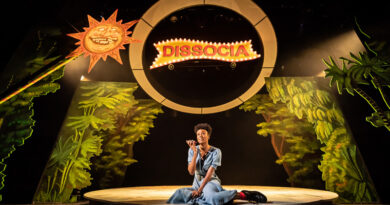“Lord of the Flies”, Chichester Festival Theatre
Simon Jenner in West Sussex
25 September 2025
★★★★
Some works seep into the culture so completely they take up a theatre of collective imagination such that they haunt any adaptation, especially if experienced early in life. Nigel Williams adapts William Golding’s classic 1954 first novel with direction by Anthony Lau.

Photo credit: Manuel Harlan.
There is not a palm leaf in sight in this Lord of the Flies. It’s an internal setting of the mind, back to that intravenous drip (as Rachel Cooke in her note refers to it) already suffusing the expectations of nearly everyone coming to the adaptation.
Designer Georgia Lowe strips the set initially to a few packing cases, their black with silver edges punctuating a dark ground. All this is progressively removed until a white stage is revealed ready for the blood-spilling that ends Act One. Use of a gallery above can be inventive, particularly with Simon’s visions. It’s the only part of the overtly Brechtian set that meshes with density, darkness, menace. The pig’s head that appears and a parti-coloured pig out of a children’s programme certainly renders its appearance and demise more comic than horrible. Though if that’s the intention, why the stage blood later? There is occasionally a naively immature element that has little to do with the boys portrayed or the actors bringing them to such vibrant life.
The most striking component is Matt Daw’s lighting from the pared-away backstage, which almost blinds when turned to full glare: both monstrous and mechanical, emblem of irrational fear, not illumination. Giles Thomas’s sound plays incongruous hits from the 1950s, a sound-world left as memory perhaps. His music though is another matter. Chris Poon’s choral direction is riveting.
Ralph (Sheyi Cole, making a memorable stage debut) immediately impresses as the not infallible leader progressively pushed out as relations degenerate. The most intuitively civilised, embodying good, he initially betrays the boy who proves to be his “wise, true friend called Piggy” as Golding finally anoints him. Whilst Ralph tries to boisterously fit in as the choir appear – in a thrilling theatrical coup led by Jack, singing Thomas’s choral snatches – Piggy never does.
Alfie Jallow gives a compelling, detailed performance to complement Cole’s charismatic appeal. There is real authority as his Piggy leans on people to hail Ralph as moral leader with continual cajoling of Ralph to assert his chiefdom. Latterly, there are elements of alarm, fright and despair as even Piggy’s glasses are famously stripped away. Civilisation’s laws incarnate, Jallow’s assertion of wrong resonates and yet is tossed aside.
Jallow stutters then blazes out what he would term the rules-based international order. In 1954 there seemed to be one. This prophetic breakdown surely influenced the dramatization of it now, and indeed an upcoming BBC production. The connection of spectacles and creation of fire is underscored here. Fusing primal flame with modern lenses, the fate of a perennially-kept signal with an impressive use of smoke, traces separation from any civilising rescue.
Tucker St. Ivany’s portrayal of Jack is a slightly mocking incarnation, the sardonic and egotistical apparent from the first. There is the bark and accent of entitlement. One that unfettered in fact becomes unhinged, even to denying surnames, once instinct with that ruling order. St. Ivany struts with a prefect’s brief authority somehow both stuck and amplified. He refers to his “gang” and Ralph’s heeding of Piggy as no longer “fun” or fitting in. There are undercurrents of class-based exclusivity, but these at least break down. Roger (Cal O’Driscoll, also making an assured debut) immediately sticks out in gawky self-justification. He is not from a grammar school, indeed a “nowhere school” but manages to fit in almost gratefully to Jack’s regimen. Hiroki Berrecloth’s Maurice instinctively has no trouble at all with Jack; just as exuberantly active Bill (Riley Woodford), and more hesitant Henry (Nevil Patel) contrast as foot soldiers whose identity is always a kind of uniform.
Act One allows tensions to throw up characters. Visionary Simon (Ali Hadji-Heshmati) only slowly separates from the pack, but when he does fully, he finds himself isolated. Starting from a quiet dissenting voice Hadji-Heshmati mixes the visionary with a cut-through clarity keener than anyone’s about the nature of the beast. His Simon hunches in darker corners, as if aware he is emitting a glow of difference. His encounter with the Parachutist (a shadowy one, ill-defined to those who don’t know it, the figure not suspended), his declamations and cornering is brilliantly handled. There is an odd, unwanted moment of supposed ending where audience members clap, thinking Act One is over, which different lighting might address. The actual – and shocking – climax of Act One looks difficult to cap and so it proves.
Act Two enjoys memorable theatrical devices, notably the large climbing frame that serves as Jack’s raised den, a kind of lookout post the gang spin dizzyingly as the hunting-down of the final two dissenters starts in earnest. There is a last wispy use of smoke to mark extinction, though dramatic irony in who wields it. Dissenters from Jack, still clinging on to Ralph, slowly peel off. Here twins Sam (Ethan Rouse) and Eric (Bertie Hawes) never entirely become the Samneric tribal fusion of the book. Though they play out their twinship, they glimmer fright and warning, as well as swirling confusion like asteroids round the stage. Most striking though is the sole “littlun” Perceval (Ruben Reuter). Aching with fright and bewilderment, Reuter cuts a haunted figure as he makes for whatever cover is nearest.
Tension does drop somewhat though, allayed by the theatricality and wilder movement that replaces the “conch” period (here a microphone, another “alienation technique” that does not quite land). Several chases and use of exits throughout are highpoints of the production too, notably by Jallow. Jallow’s trajectory, from flinching beginnings to a cry for order and terror when he’s increasingly a target, is the solar plexus of the show. A denouement with the appearance of the Naval Officer (Jonathan Savage) is muted. He rises out of the audience and barks. Savage then pulls back from sounding as crisp and patriarchal as one might imagine an officer sounding. There’s a tiny gesture of reconciliation, one almost of imploring.
A flawed, concept-driven production, it is given force by the sheer quality of the young actors. Unresolved tensions in the production are mostly overcome but the cast’s bravura, willingness to portray vulnerability (with some outstanding performances) make this compelling. The adults are meant to restore order. Here, the young professionals restore the integrity of mayhem.









